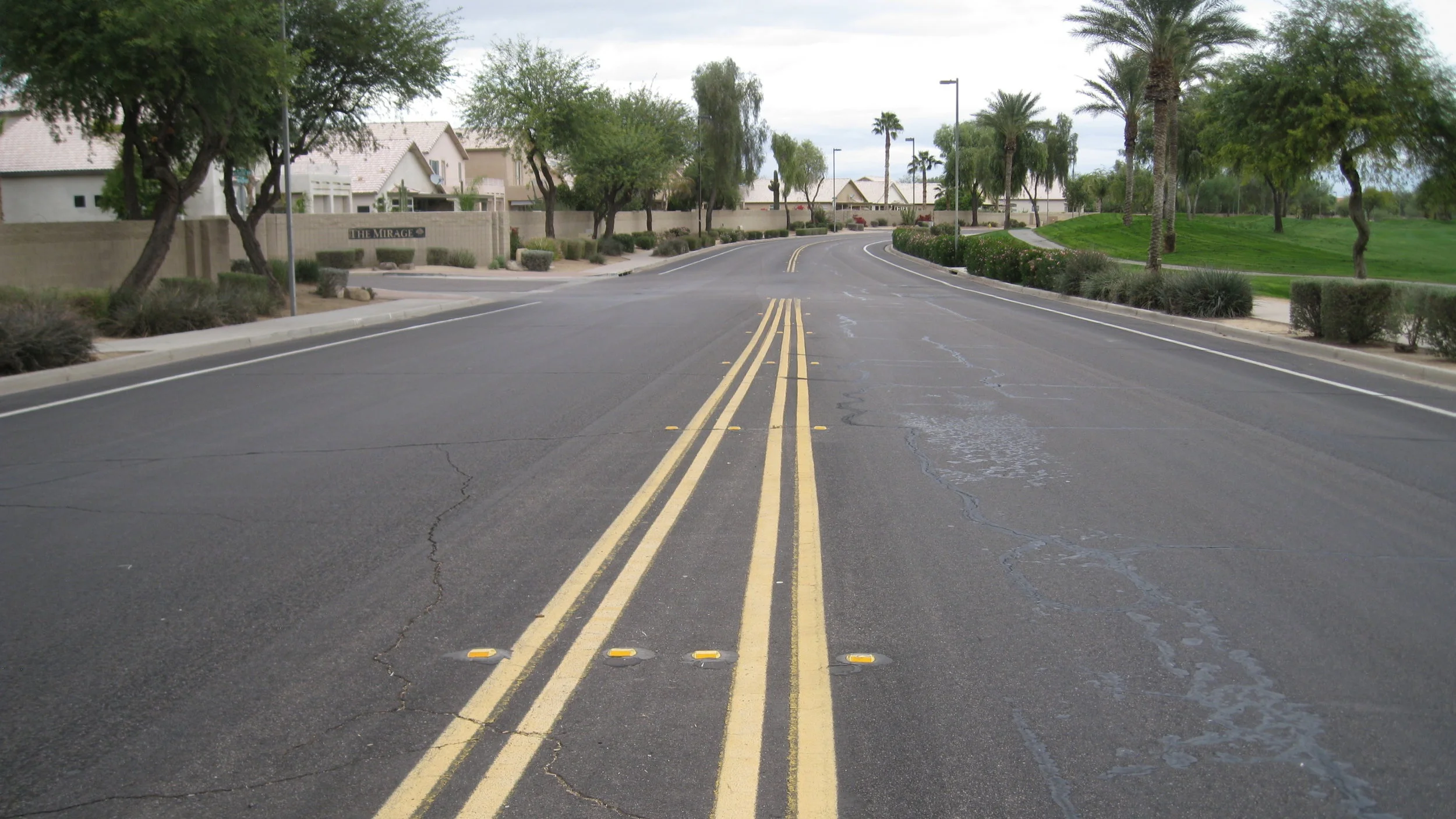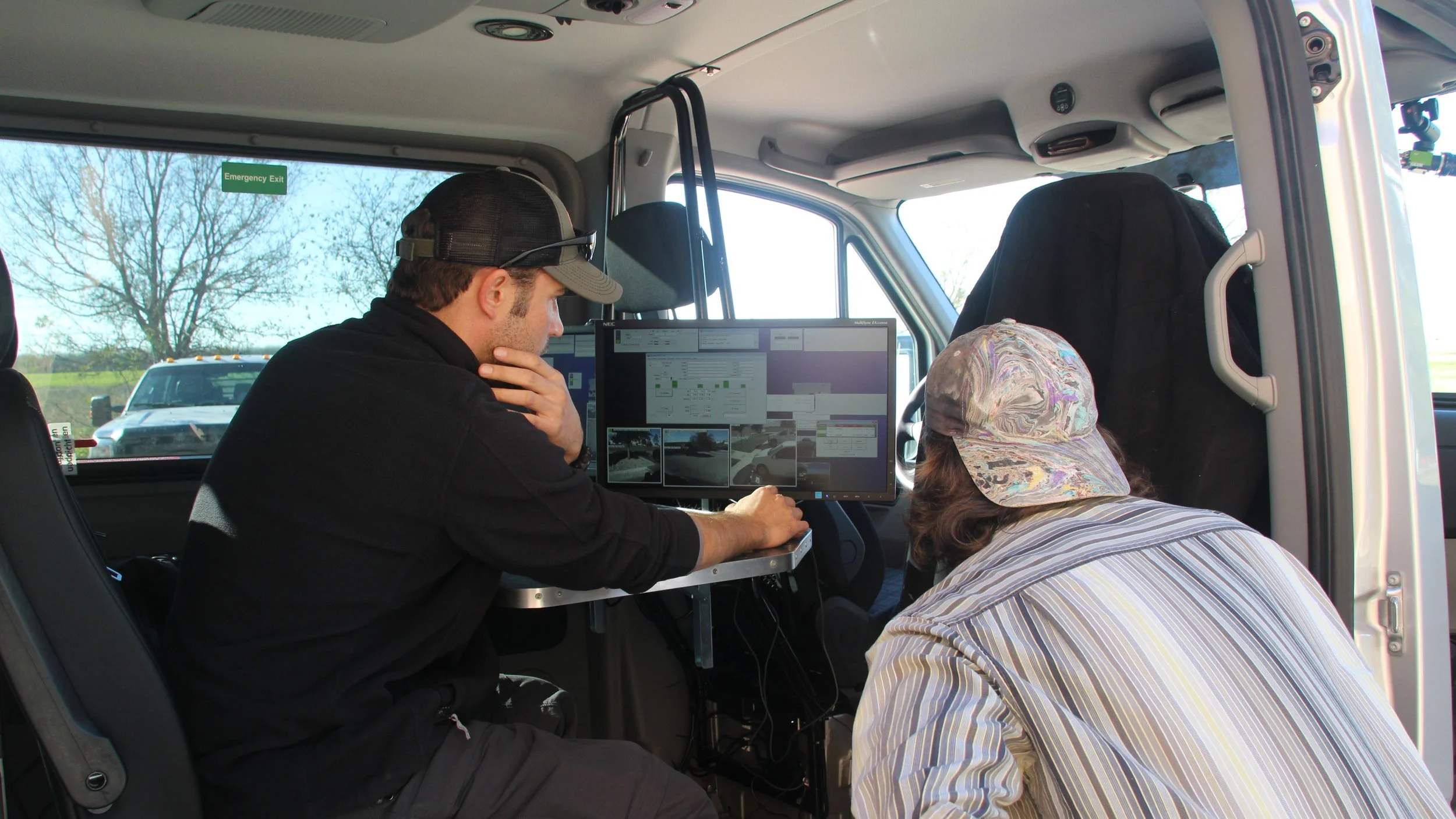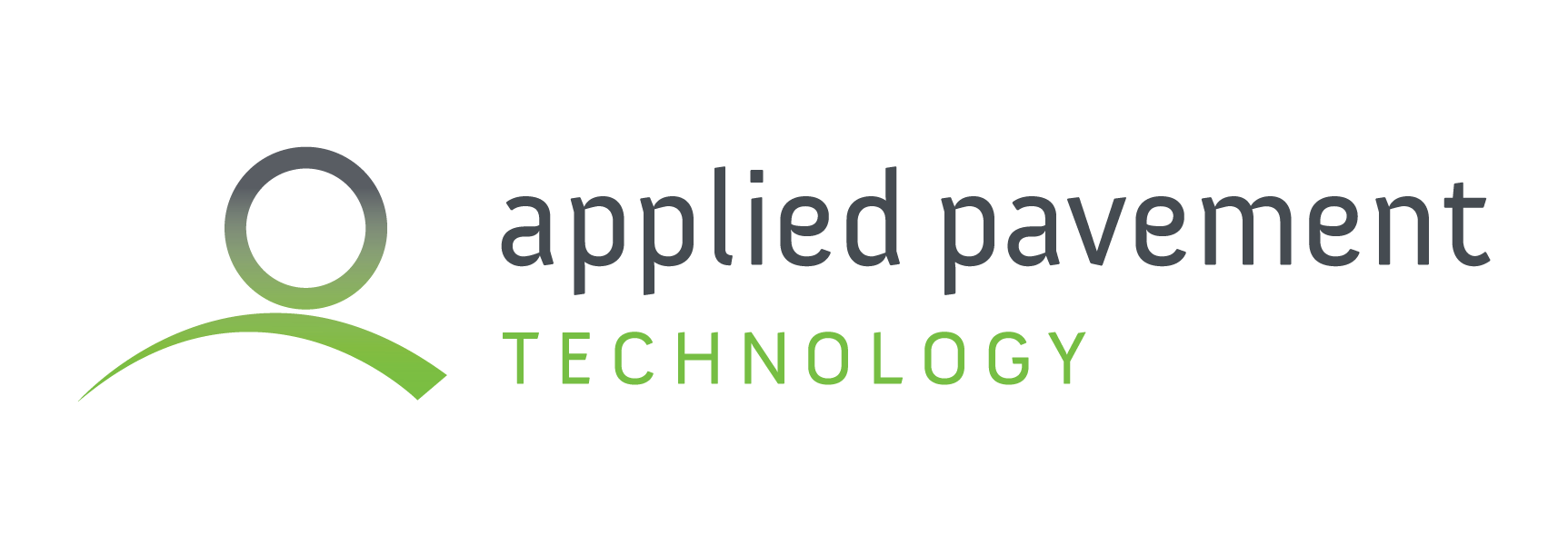
Knoxville Regional Transportation Planning Organization Pavement Management Services
Knoxville-Knox County Regional Transportation Planning Organization (TPO) was in search of an experienced firm to provide it with the necessary tools to support implementation of pavement management for its member agencies. APTech was chosen to provide these services in two phases.
Phase 1 was completed over the course of 2020 and 2021 and involved the development of pavement management implementation plans for participating agencies (Maryville, Clinton, Oak Ridge, Knoxville, and Blount County). This was accomplished by informing agencies about the benefits of pavement management, developing and leading workshops, hosting follow-up discussions, and developing a Phase 2 implementation plan.
The Phase 2 plans started in 2022 and consisted of implementing pavement management systems (PMS) for participating agencies. These tasks include:
Automated condition data collection using APTech’s enhanced data gathering equipment (EDGE) van
Selecting pavement management software and assisting with its configuration and implementation
Reviewing agency treatment approaches and recommending possible improvements using preservation and maintenance
Providing additional engineering support services
Three of the agencies did not have PMS systems in place at the outset. These agencies are eager to determine and report needs using data-driven, performance-based decision processes. Two of the agencies were dissatisfied with the systems they were using, so our work greatly improved their capabilities. Given the success of this effort, the TPO has received approval for expanding this effort in fiscal years 2023 to 2026 to include re-collection of condition data and adding agencies who would like to participate.

City of Champaign, Illinois Pavement Management System Update
The City of Champaign, IL sought professional engineering services related to pavement management for multiple inspection cycles, starting in 2021 and running through 2028. APTech is supporting the City with several pavement management services, including:
Updating pavement condition data collection for local, collector, and arterial streets
Updating the PAVER database
Providing updates to APTech’s web-based pavement management tool, IDEA
Providing the City with comprehensive reports
Conducting any special studies as defined by the City, such as:
Evaluation of brick streets
Evaluation of premature failures
Evaluation of selected roadways for consideration of suitable repair options
Through this work, APTech has supported pavement management needs for the City since 2014. Reports are generated on an as needed basis to respond to needs such as City Council presentations. APTech’s IDEA tool has provided the City with a web-based visualization tool for their pavement management data, making it much more accessible.

Goodyear, Arizona Pavement Management System and Treatment Strategy Evaluation
The Client's Goal
Determine if the current pavement management system will continue to meet the City's growing needs and identify ways to increase the use of pavement preservation in the City's program.
Our Work
Evaluated the current pavement management system
Provided recommendations for potential areas of improvement
Evaluated treatment strategies and the pavement management program
Prepared recommendations for annual program planning
Developed project schedule and funding scenarios
Researched treatments used by agencies in the Phoenix area
Helped develop specifications for the City
Assisted with incorporating pavement preservation strategies
Assisted developing budget needs for their program
The Outcome
Through our efforts and focused attention in this area the City of Goodyear found opportunities to improve pavement management practices and develop work plan recommendations. This allowed them to achieve their goals more efficiently. They were able to project network condition under different funding scenarios, which allowed Goodyear's decision-makers to weigh alternatives and make appropriate investment decisions to achieve performance goals. Bolstered by our recommendations, the Public Works department requested and received a funding increase of 30 percent from the City Council for its roads program.

Alaska Department of Transportation and Public Facilities Pavement Management System
The Client's Goal
Develop and calibrate initial performance models for Alaska Department of Transportation and Public Facilities' (DOT & PF) pavement management system (PMS) so the agency can predict performance and funding needs with greater confidence.
Our Work
Reviewed existing pavement condition data.
Organized condition data into databases linked with pavement management road segments for more accurate modeling.
Assisted the agency with defining representative pavement families and included this information in the condition databases for modeling analyses.
Worked with the PMS vendor to define reasonable and appropriate pavement families and generate performance models for rutting, longitudinal profile (IRI), and cracking that were coded into the PMS.
Coordinated with the PMS software vendor to ensure compatibility between the software, the pavement families, and the performance models.
Documented efforts in a comprehensive project report.
The Outcome
Due to APTech’s efforts, the Alaska DOT&PF was able to use historic condition data and recent cracking data to develop performance models in its new statewide PMS. Now the agency can generate reasonable projections of performance and better estimates of maintenance and repair work needs.

City of Miami, Florida Pavement Management System Implementation and Analyses
In 2019, the City of Miami decided to move toward a more data-driven, informed decision making process for their transportation asset needs. Rather than planning reactively, the City sought an enterprise-wide asset management system that would support cross-asset class decision making. APTech was part of a team that collaborated closely with the City to successfully deliver all aspects of this work, including collecting inventory and condition information for a wide range of transportation assets and implementing an asset management system that would allow the City to manage their assets effectively.
As part of this effort, APTech completed the automated data collection for about 700 centerline miles of City streets and assisted the City with development of pavement family definitions, along with the development of treatment protocols and performance models for each defined pavement family. APTech performed multiple budget scenario analyses using Scenario Builder and supported agency training for updates to treatment protocols and use of Scenario Builder to perform PMS analyses. In response to requests from the City, APTech also provided guidance on future updates and pavement management planning needs.
As a result of this work, the City of Miami is now able to estimate work needs and network conditions into the future, provide information to decision makers about the impact of budget adjustments, and improve their maintenance and preservation practices to make more effective use of limited resources.

City of Urbana, Illinois Pavement Management System Support Services
In 2018, the City of Urbana (City) hired Applied Pavement Technology, Inc. (APTech) as its pavement management consultant with the goals of implementing a new pavement management system (PMS) and documenting the City’s pavement conditions. Prior to this effort, the City managed their pavement assets using spreadsheet tools for many years and was ready to use more objective and accountable processes to perform budget scenarios, prioritize work needs, and generate reports to decision makers.
As part of this effort, APTech completed condition data collection using its automated data collection vehicle (EDGE) and extracted distress data to produce pavement condition index (PCI) values for each road segment. APTech also completed condition surveys of City parking lots and shared-use bike paths. Condition data reports were provided in GIS shape files while treatment strategies and performance models were also developed. This work allowed APTech to configure PAVER to support analyses.
APTech’s work has allowed the City to be more responsive to inquiries and make better long-term plans impacting the City roadway network. The City is more accountable and proactive, resulting in more efficient use of limited resources. This project was so successful, that in 2022 the City retained APTech to continue providing similar services. These have included updating work history information and updating analysis projections from the PMS to help the City update planning documents.
In addition, the City has asked APTech to provide guidance on levels of service and appropriate treatment alternatives as it looks toward improvements in its roadway network over time.

Bozeman, Montana Pavement Condition Assessment and Analysis
The City of Bozeman, Montana, partnered with APTech, established two primary goals for this project. The first was to complete a pavement condition assessment for approximately 242 centerline miles of roadway and update the City’s PAVER database. The second was a detailed comparison between the 2013 assessment and this current work in an effort to assess the effectiveness of the City’s street maintenance program. The City also asked APTech to provide recommendations where appropriate for possible improvement moving forward.
APTech’s for this project work included:
Reviewing and updating the current PAVER database with new roadways and any work history done since the last update
The updated shape file was then used to prepare for condition data collection
Collecting data using the Enhanced Data Gathering Equipment (EDGE) automated data collection van
Conducting distress surveys, which identified cracking and other distresses on the images
Performing additional reviews by trained surveyors to validate the automated process and confirm the results aligned with ASTM D6433
The outcome was then tabulated by distress type, severity, and extent by road segment
Preparing the longitudinal profile, summarized as International Roughness Index, and rutting measurements
Loading the distress data and rutting into PAVER to calculate the pavement condition index (PCI)
Comparing the 2013 and current pavement conditions
This allowed APTech to comment on the effectiveness of the City’s street maintenance program
Proving treatment strategies and opportunities for improvement
The assessment provided the City with an updated PAVER pavement management system (PMS) database to use in work planning and budgeting, an objective review of maintenance program effectiveness, and recommendations for improved strategies that make more effective use of agency resources. These deliverables will help the City make accountable, data-driven, performance-based decisions about needs.

City of Bastrop, Texas Condition Data Update
To better plan work needs, Bastrop, Texas required updated pavement condition information for its 60-mile street network, summarized as Pavement Condition Index (PCI) values based on ASTM Standard D6433. The city needed this information in a format that could be effectively communicated and could be displayed as part of its GIS database. APTech was selected to provide this service in 2018, then again in 2022.
As part of this work, APTech deployed its enhanced data gathering equipment (EDGE) van to gather detailed, spatially-referenced pavement condition data for all City-maintained streets. This included distress data, longitudinal and transverse profile, and multi-view Right-of-Way imagery. APTech used the distress data to determine road segment PCI values and then added the PCI and date of data collection as attributes in the City GIS database. In the 2022 work, APTech added additional date and condition attributes so the City could compare conditions between the two data collection rounds
As a result of our work, Bastrop was able to display current information for Council review. As a value-added benefit, APTech provided a map-based viewer that allows the City to see all of its collected data as it “drives” the network from the safety of their office computers. This project enhances the City’s ability to make decisions about needs, support those decisions with real data, be responsive to inquiries, and communicate specifics to stakeholders effectively and efficiently.

Fort Bend County, Texas Pavement Management Support
APTech was hired as a subcontractor to SHI International Corp. to assist with the implementation of Cartegraph OMS for Fort Bend County, Texas. Fort Bend County has almost 2,000 miles of roads that it manages. The County is eager to proactively manage its roadway assets and support budget projections with clear, accountable, map-based information. APTech is pleased to have supported this effort and worked with the County to improve its capabilities.
APTech collected automated condition data using its enhanced data gathering equipment (EDGE) van and processed this data to produce distress and profile summaries by road segment. This data was loaded into Cartegraph and reviewed by the County for accuracy. APTech then worked with the County to establish pavement families, treatment strategies, and performance models for configuration of the PMS. Next, APTech ran initial scenarios for the County and provided training to the County in configuration of the PMS and running scenarios so it can complete analyses on its own after project completion.

Kane County, Illinois Pavement Management System Implementation
For years, the Kane County Department of Transportation used Illinois’ Condition Rating System (CRS) and a proprietary pavement management system (PMS) to manage their roadway network. However, after experiencing difficulties updating the system, the County switched to a newer asset management tool, expanding on their existing relationship with Cartegraph (OMS). The County hired APTech to manage the effort and successfully implement OMS and provide training for the County.
Our work included:
Collecting condition data for the County’s 350 miles of roads using APTech’s EDGE van
Summarizing the collected data as PCI values
Configuring OMS with treatment strategies and performance models that were representative of County practice
Providing training to the County on the use of Scenario Builder to perform budget analyses and create work needs projections
Using historical condition data to assess treatment effectiveness and help the County decide which treatments were the most beneficial in terms of cost
Extracting asset information from right-of-way (ROW) imagery to update the County GIS with more complete data
The County now has the capability to perform budget scenario analyses and can produce clear presentation graphics for interaction with decision makers—a key objective of the project. Due to the success of this project, in 2022 APTech was re-selected to provide the same services in 2023.

City of Glenwood Springs, Colorado PASER Surveys and Pavement Preservation Plan
The Client's Goal
Perform pavement condition surveys and develop a three-year pavement preservation plan for 43 centerline miles of publicly-owned roadways and parking lanes.
Our Work
Performed pavement condition surveys according to the Pavement Surface Evaluation and Rating (PASER) methodology.
Analyzed the PASER data.
Developed work-needs tables by year at specified budget levels.
Developed maps of work plans and projected network condition at specified budget levels.
Documented pavement condition, treatment strategies, and work plans.
The Outcome
The PASER condition surveys and pavement preservation plan developed by APTech enhance the City's ability to make data-driven decisions, respond to inquiries, and communicate current and future condition and budget impacts to stakeholders effectively.

City of Fort Wayne, Indiana East State Boulevard Pavement Eval and Rehab Design
The City of Fort Wayne, Indiana selected APTech as a subcontractor to evaluate the condition of a 1.3-mile segment of East State Boulevard and develop rehabilitation design recommendations.
Our work for this project included:
Collecting and reviewing records regarding the existing pavement structure and the traffic loadings applied to the pavement.
Performing a Pavement Condition Index survey with 100 percent coverage to objectively rate the condition of the pavement.
Mapping the locations, severity levels, and amounts of pavement distresses to identify appropriate treatments and estimate quantities of treatments.
Conducting falling weight deflectometer (FWD) testing to assess the pavement's structural condition.
Developing coring and subsurface boring plans and dynamic cone penetrometer testing plans, and evaluating the test results to determine layer thicknesses, subsurface conditions, and subgrade support conditions.
Analyzing historical traffic data and developing projected traffic growth rates for pavement design development.
Quantifying the structural properties of the pavement and determining the pavement's load-carrying capacity through FWD backcalculation analysis.
Developing feasible rehabilitation design options and performing a life-cycle cost analysis to identify the most cost-effective strategy.
Summarized this information and presented a recommended rehabilitation design in a project report.
The results of the evaluation indicated that concrete pavement restoration in the form of slab replacements, partial- and full-depth portland cement concrete repairs, diamond grinding, and joint resealing, was the preferred rehabilitation strategy. The recommendation was accepted, and plans were made to implement this long-term, cost-effective approach.

Clackamas County, Oregon TAM Strategic Plan
We provided Clackamas County with a Transportation Asset Management (TAM) Strategic Plan within its Department of Transportation and Development (DTD). The TAM Strategic Plan focused on current assets and processes, but the long-term expectation is that the Plan will support a dynamic program that effortlessly adapts to the addition of other future assets. The TAM Strategic Plan serves as a roadmap that the DTD can use to:
Integrate all transportation data sets and tools to a consistent set of standards.
Establish and document efficient processes.
Integrate decision making across business units.
Implement effective decision support tools.
The project began by developing asset management objectives for the agency by conducting on-site workshops, leading DTD staff through a self-assessment effort, and conducting a review of current and desired information technology systems.
Using the information gathered in the previous phase, APTech worked with the agency to establish a baseline of the agency’s current TAM maturity. This was done in terms of People (organization and policies), Processes (practices and internal controls), Systems (tools and technologies), and Data (content, integration, and governance) through a combination of phone interviews, on-site workshops, and spreadsheet tools.
Next, APTech led the agency through a gap analysis effort. This was completed through on-site workshops and phone interviews to compare baselines with goals in order to identify and prioritize strategies for achieving their goals. Each strategy included action items with scope, schedule, and cost information. We then developed a roadmap document that defined the path to achieving the agency’s TAM goals. Finally we provided support to the DTD during initial implementation efforts.
The Outcome
The TAM Strategic Plan provided direction to DTD management and staff, allowing for a coordinated TAM implementation effort. The agency anticipates significantly increased funding for asset preservation, due to a newly passed State revenue bill. DTD expects the plan to facilitate integration of its maintenance and capital planning efforts, allowing the agency to make the best use of these new funds and ensure on-time delivery of future highway projects.

Lynnwood, Washington Data Collection and Cartegraph Implementation
In 2021, the City of Lynnwood, Washington determined that it required a pavement management system (PMS) to improve planning for budget and work needs and to better communicate conditions and needs to decision-makers. The City has a working relationship with Perteet, Inc. (Perteet) to support planning activities. APTech, as a subcontractor to Perteet, was selected to assist with roadway condition data collection, implementation of Cartegraph’s Operations Management System (OMS), and to provide training in the use of OMS to the City and Perteet so that they can use this tool effectively in the future.
Our work included:
Collecting pavement condition data for about 175 centerline miles of City streets using our automated data condition collection vehicle (EDGE)
Using collected images and data to report distress type, severity, and extent for each road segment
Loading the collected data into OMS
Providing guidance in the configuration of OMS for analyses
Documenting our work in a summary report detailing current conditions and recommendations
Due to the success of the work, we were asked to participate as an on-call consultant to help the City and Perteet continue to use the PMS system. This work allows the City and its representatives to proactively plan for budget and work needs in the future and to clearly communicate work plans and budget impacts using map-based tools to decision-makers. This will in turn enable the City to make better use of limited resources and more informed data-driven decision making.

Maryville, Missouri Pavement Assessment and Management Plan
The City of Maryville, Missouri chose Applied Pavement Technology (APTech) to conduct a citywide pavement assessment and develop a management plan for approximately 250 miles of road.
From 2023 to 2024, APTech worked with Maryville to collect pavement data and establish a Pavement Management System (PMS). APTech presented multiple PMS options, showcasing how each software solution would fit the City’s long-term needs and budgetary requirements. The City chose StreetLogix for their PMS. APTech then used its Enhanced Data Gathering Equipment (EDGE) vehicle to collect automated pavement condition data on all City-maintained roadways. Trained APTech pavement inspection technicians reviewed collected data to verify distresses were correctly identified and configured StreetLogix PMS with this data, establishing pavement families, setting up performance models, and defining treatment strategies. APTech also developed 20-year scenarios for the City to help them understand how different funding levels would affect their road network.
APTech’s work collecting pavement condition data and establishing a PMS provided the City with a baseline for work planning and budgeting, an objective review of maintenance program effectiveness, and recommendations for the most efficient use of agency resources. These deliverables will help the City make accountable, data-driven, performance-based decisions about needs.
















